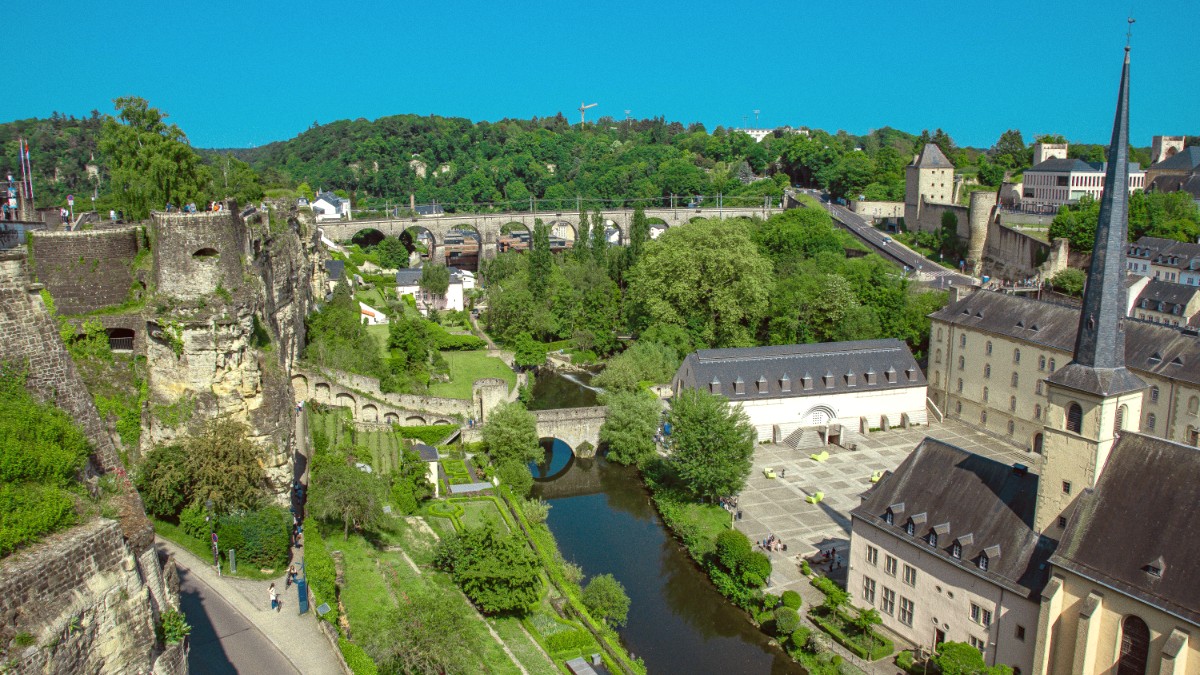
Luxembourg
Spring (March-May): Average temperatures range from 5°C to 15°C (41-59°F). Days gradually warm up, with April and May quite pleasant. Rainfall appears moderate, but spring showers are common. An Umbrella or Waterproof jacket brings utility. Humidity remains generally moderate. Spring sees the city's parks and gardens alive with blooming flowers and fresh greenery, setting a beautiful scene for outdoor walks.
Summer (June-August): Average temperatures range from 15°C to 25°C (59-77°F). July and August are the warmest months. Occasional heatwaves bring higher temperatures, though this is not a regular occurrence. Rainfall distributes throughout the year, with slightly higher precipitation in summer, often as afternoon thunderstorms. Humidity appears moderate, with an increase during rainy periods. Long daylight hours characterize summer, enabling extended sightseeing and outdoor dining. The city hosts numerous outdoor events and festivals.
Winter: Roads and walkways can become icy, especially in the city’s hilly areas and cobblestone streets. Pedestrians benefit from caution. Winter tires are mandatory for vehicles during certain periods, a point to remember for car rental.
Summer: Occasional thunderstorms appear, usually in the late afternoon or early evening. These typically pass quickly but bring heavy rain.
June-August
Warmest weather, ideal for outdoor activities, long daylight hours, full attraction hours, numerous events.
Higher prices for accommodation and flights, more crowds, advance booking for tours.
April-May, September-October
Pleasant temperatures, fewer crowds, dropping accommodation prices, good for hiking and natural surroundings.
Variable weather with possible rain, reduced hours for some outdoor attractions.
November-March
Lowest prices for accommodation and flights, very few crowds, festive atmosphere during Christmas markets, snow-covered landscapes.
Coldest weather, shorter daylight hours, limited outdoor activities, reduced hours or closures for attractions.
May to September suits city exploration. Most attractions stay fully open. The weather supports leisurely walks through the city.
Late November to late December delivers a magical experience. Festive lights, decorations, and seasonal treats abound.
November to March (excluding the Christmas market period) presents the best opportunities for lower costs on flights and accommodation.
This period often brings significant savings on travel expenses.
Enjoy attractions with minimal crowds during the off-peak months.
Experience an unique, peaceful atmosphere with the possibility of snow-covered scenes.
More flexibility with bookings and spontaneous plans.
Luxembourg participates in the Schengen Area, a group of 27 European countries that have abolished passport and other types of border control at their mutual borders.
For short stays (up to 90 days within any 180-day period), non-EU/EEA/Swiss citizens may need a Schengen Area visa. This "C-visa" type covers tourism, business, and visiting family. For longer stays or specific purposes like work or study, a "D-visa" becomes necessary.
Gathering correct documents before your application and travel simplifies the process.
For typical tourist activities within Luxembourg City and the country, no general special permits are required.
Luxembourg's high standard of living translates to higher travel expenses compared to some other European destinations. However, smart planning and utilizing local benefits aid cost management.
The official currency is the Euro (€). ATMs are widely available throughout Luxembourg City, including at the airport, train station, and in most neighborhoods. These offer a convenient way to withdraw cash at favorable exchange rates. Banks and exchange offices also exist but generally provide less competitive rates.
Credit cards, especially Visa, Mastercard, and American Express, are widely accepted at hotels, restaurants, and shops. Carrying a small amount of cash for smaller purchases or markets is a good idea. Inform your bank of your travel plans to prevent card usage issues.
Daily costs for budget travelers range from €70-€120. This includes hostel dorms or basic hotels, supermarket meals, and free public transport.
Utilize free public transport, enjoy free attractions like Chemin de la Corniche.
Frequent restaurant dining can quickly elevate costs.
Daily costs for mid-range travelers range from €120-€250. This covers comfortable 3-star hotels and a mix of dining options.
Inclusion of paid attractions and occasional guided tours.
Frequent taxi use or high-end dining will push towards the luxury bracket.
Daily costs for luxury travelers begin at €250+. This covers 4-5 star hotels, fine dining, and exclusive experiences.
Indulge in private transfers, premium cafes, and high-end shopping.
Budgeting becomes less of a concern, with focus on premium services.
| Category | Price Range (EUR) | Notes |
|---|---|---|
| Hostel Dorm | €30-€50 | Per night |
| Mid-range Hotel | €100-€200 | Per night |
| Dinner (Mid-range) | €25-€50 | Per person |
The country maintains a high standard of public safety and healthcare, establishing a very safe destination for travelers. Awareness of common issues and preparedness measures still receive a recommendation.
No specific vaccinations are necessary for entry into Luxembourg from most countries.
Ensure your routine vaccinations (MMR, Diphtheria-Tetanus-Pertussis, Varicella, Polio, Flu shot) are current.
Minor issues like colds or stomach upset may arise. Practice good hand hygiene, stay hydrated. Tap water here is safe.
Luxembourg boasts a high-quality healthcare system.
Hospitals and clinics are readily available, notably in Luxembourg City. Many medical professionals speak English, French, and German. Pharmacies (indicated by a green cross sign) are numerous. They dispense prescription medications and a wide range of over-the-counter remedies.
Luxembourg City generally presents a very safe environment with low crime rates, often ranking among the safest capitals in Europe.
Food safety standards across Luxembourg are very high. Eating out is generally safe.
Police, Fire, and Ambulance (common European emergency number).
For non-emergency police assistance.
Pickpocketing can occur in crowded tourist areas; maintain awareness, secure valuables.
Natural disasters are rare in Luxembourg; no earthquakes, tsunamis, or hurricanes.
Comprehensive Travel insurance before your trip is highly recommended. A good policy covers medical emergencies, trip cancellation, baggage loss, and personal liability. For minor ailments, hydration and hand hygiene assist prevention. Tap water in Luxembourg City is safe for drinking, eliminating the need for Bottled water for general use; consider a Reusable water bottle for sustainability. Secure valuables in an RFID-blocking money belt or cross-body bag to guard against petty crime.